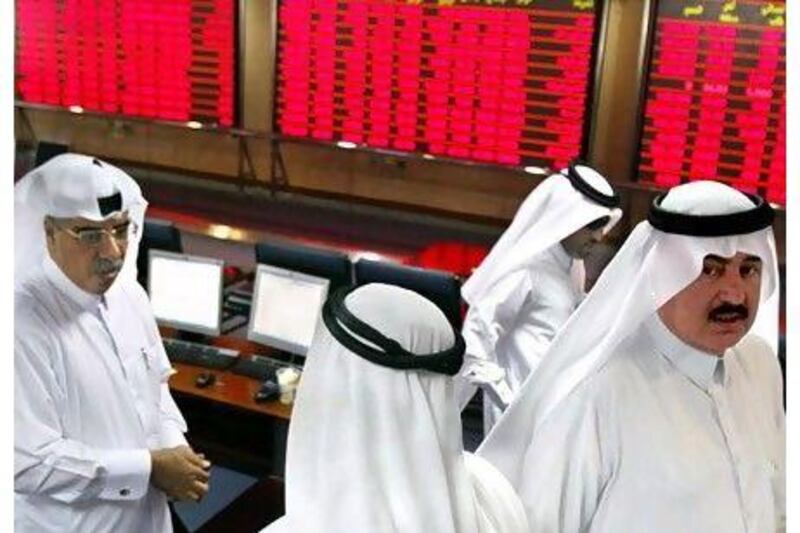Tucked away in "old" Doha, Qatar's stock exchange looks more like a suburban bank branch than a national bourse.
With a few local men lounging on seats in front of a screen that displays the listed equities, and a bored-looking teller waiting for someone to place a trade, it is a very different from the "bear pit" trading atmosphere of New York.
But, like the rest of Qatar's capital city, looks can be deceiving. The outwardly sleepy exchange is home to some of the region's largest industrial, financial and property giants including Industries Qatar, a petrochemicals maker and Qatar National Bank, the country's largest lender. Their collective shares are worth more than US$125 billion (Dh459.12bn).
Now the government wants to attract more listings as it seeks to become one of the region's key financial capitals. That is expected to require the easing of restrictive foreign ownership rules and developing capital markets to encourage debt as well equity issuances to help to fund billions of dollars in infrastructure planned over the next 10 years.
It will also require a new approach to investor relations as shareholders from the GCC region and beyond seek to take part in the transformation of Qatar.
"Qatar has come from nowhere to be the second-largest bourse in the region," says Arnab Banerji, the chairman of Collabrium Capital and recently appointed to the board of Qatar Financial Centre Authority.
He expects the country to capture an increasing share of institutional investors and fund managers as its legal and regulatory framework becomes more sophisticated.
The Qatar Exchange, known as Doha Securities Market until June 2009, is dominated by government-linked listings to a greater extent than any other regional bourse. It also has limited exposure to foreign investors - a situation likely to change as Qatar aims to attract more institutional investment as part of a drive to establish a regional insurance industry hub.
Along with the UAE, Qatar missed out on being upgraded to emerging market status by the index compiler MSCI in June. For Qatar, the principal stumbling block has been its very low levels of foreign share ownership, which it will need to address in order to gain an upgrade from its existing frontier market status.
"This issue has been put forward as the major impediment to a potential reclassification," MSCI said in a report published on June 20.
The current value of Qatari shares available for foreign ownership is about $10bn compared with a total market capitalisation of more than 10 times that value.
But some experts have expressed scepticism over the need for the country to raise foreign ownership limits as well as casting doubt over the importance of an MSCI upgrade for the market.
"I don't believe increasing the foreign ownership limit has any relation to developing Qatar as an asset management hub," says Akber Khan, the director of asset management at Al Rayan Investment, an investment bank based in Doha. "Foreign investors already own more than $7.5bn of Qatari equities despite existing limits; in addition, not a single Qatari stock is at its foreign ownership limit."
He believes other factors, such as the local legal, tax and regulatory framework, are more important in attracting financial companies.
The country is planning to spend $125bn in preparation for the 2022 Fifa World Cup and related infrastructure projects. While football has grabbed most of the headlines, the country's financial aims are no less ambitious and built around developing three core sectors - asset management, reinsurance and captive insurance.
Qatar is one of the smaller Arabian Gulf states with a population of about 1.9 million, of whom nationals number just 300,000. But it has led economic growth in the region over the past decade with GDP expanding by a factor of 10 to about $186bn last year. It is also home to the highest net-worth individuals in the world, regularly topping the charts for GDP per capita.
As the rate of economic growth begins to slow, despite World Cup-related infrastructure spending, the government has drawn up a strategy to turn Doha into a regional financial capital.
"You will also see a number of companies that will come and list on the exchange to raise capital," says Shahzad Shahbaz, the chief executive of QInvest, another investment bank based in Doha. "A lot of people are waiting for market conditions to get better."
The huge funding requirements related to 2022 World Cup projects are expected to stoke demand for local bond and sukuk sales, which analysts say will be a key part of Doha's evolution into a financial capital of the region.
"At the funding level, Qatar has made the decision to create and maintain a bond market because it's from bond markets that we work out what the discount rate on various securities are," adds Mr Banerji.
In July, Qatar sold a $4bn sukuk, one of the biggest islamic bonds ever issued. It followed a $5bn conventional bond sale in November.
While the country looks forward to 10 years of frenetic construction driven by World Cup preparations, the wider economy is slowing down as the production of liquefied natural gas, the feedstock of its prosperity, reaches a plateau.
Gas revenues have helped Qatar to pack a big global punch as both a political power broker and an owner of trophy assets worldwide - from Harrods luxury store in London to France's Paris St Germain football club. It is now aiming to create world-class financial institutions at home that could place it in competition with far more established corporate capitals in the Gulf.
"The growth rate that Qatar has experienced will not continue at this blistering rate," concludes Mr Banerji.
"The point is, from being nowhere on institutional radars, it has become something."





